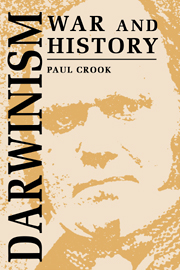 Darwinism, War and History
Darwinism, War and History Book contents
- Frontmatter
- Contents
- Acknowledgements
- Introduction
- 1 The Darwinian legacy
- 2 The age of Spencer and Huxley
- 3 Crisis in the west: the pre-war generation and the new biology
- 4 ‘The natural decline of warfare’: anti-war evolutionism prior to 1914
- 5 The First World War: man the fighting animal
- 6 The survival of peace biology
- 7 Naturalistic fallacies and noble ends
- 8 Conclusion
- Appendix: Social Darwinism
- Notes
- Bibliography
- Index
6 - The survival of peace biology
Published online by Cambridge University Press: 31 August 2009
- Frontmatter
- Contents
- Acknowledgements
- Introduction
- 1 The Darwinian legacy
- 2 The age of Spencer and Huxley
- 3 Crisis in the west: the pre-war generation and the new biology
- 4 ‘The natural decline of warfare’: anti-war evolutionism prior to 1914
- 5 The First World War: man the fighting animal
- 6 The survival of peace biology
- 7 Naturalistic fallacies and noble ends
- 8 Conclusion
- Appendix: Social Darwinism
- Notes
- Bibliography
- Index
Summary
Reworking the mainstream tradition
Peace biology – always adaptive and resilient – responded inventively to the challenge and trauma of the war, reworking the mainstream tradition that had been founded on Darwin's holistic ecology. Its spokesmen regrouped, beat a strategic retreat on some fronts, launched an offensive on others, while managing to preserve the essentials of the liberal peace myth: faith in enlightened science and culture, human malleability and a better future. The massive destruction of life in the trenches seemed utterly to vindicate peace eugenics, while the ‘unspeakability’ of the Prussian foe helped greatly to discredit militaristic Social Darwinism. Nevertheless, there were submerged ambivalences and discursive tensions within the peace biology discourse. They arose during the debates over the eugenics of war and the legitimacy of analogies from nature. The logic of eugenics threatened to lead the peace movement into dangerous deterministic territory. Again, the critics of neo-Darwinist ‘distortions’ of selectionist theory were more than a little double-faced. They anticipated modern geneticists, such as Dobzhansky, in claiming ‘fitness’ to be a value-free concept, that must be cut away from undesirable (especially militaristic) social connotations. But they were less adept in dissociating ‘fitness’ from their own value system.
Peace literature continued to endorse biologically the human capacity to escape the trammels of nature, despite man's apparent fall from grace during the First World War. As the Scots physician Robert Munro phrased it, humans had learnt ‘the art of dodging many of the operations of the cosmic forces’.
- Type
- Chapter
- Information
- Darwinism, War and HistoryThe Debate over the Biology of War from the 'Origin of Species' to the First World War, pp. 153 - 175Publisher: Cambridge University PressPrint publication year: 1994


